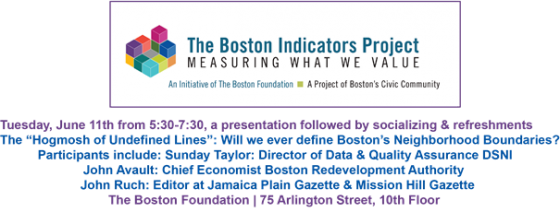Dear Colleagues,
The Boston Indicators Project invites you to our third Data Open House focused on improving data access and visualization skills among local journalists and community-based analysts:
Where one Boston neighborhood ends and another begins has been a hotly debated issue. Different city agencies, neighborhood residents, and community & media organizations embrace diverging and often conflicting views of what Boston’s neighborhood boundaries look like. Come join us for a Boston Indicators Project Data Open house in a conversation about these different delineations from perspectives grounded in data, journalism, and advocacy. We’ll discuss if and why consensus is important, whether & how conflicting boundaries matter, and how it affects the efforts of data analysts at community based organizations, journalists and residents. We’ll also spend time over cocktails and hors d’oeuvres being exposed to new tools for boundary definition and discuss our own definition of what Mayor Menino calls the, ‘hogmosh of undefined lines.’
The goal of this open house series is to bring together community-based data analysts, data-driven journalists, and other data enthusiasts to increase our collective exposure to experts and best practices in using data to drive community change. These open houses have been part of the lead up to Data Day– an all-day conference on June 21 at Northeastern University, aimed at helping organizations, news organizations and municipalities expand their capacity to use technology and data in innovative ways to advance community and organizational goals.
Please RSVP here if you plan to join us on June 11th and please share with your networks.
If you have any questions, feel free to contact Nse Esema, Digital Media & Research Associate for the Boston Indicators Project at nse.esema@tbf.org.
We hope to see you,
The Boston Indicators Project Team
About the Boston Indicators Project
The Boston Indicators Project offers new ways to understand Boston and its neighborhoods in a regional, national and global context. It aims to democratize access to information, foster informed public discourse, track progress on shared civic goals, and report on change in 10 sectors: Civic Vitality, Cultural Life and the Arts, the Economy, Education, the Environment, Health, Housing, Public Safety, Technology, and Transportation. The Boston Indicators Project is an initiative of the Boston Foundation with support from the Metropolitan area Planning Council and the City of Boston. For more on the Project, visit www.bostonindicators.org.

